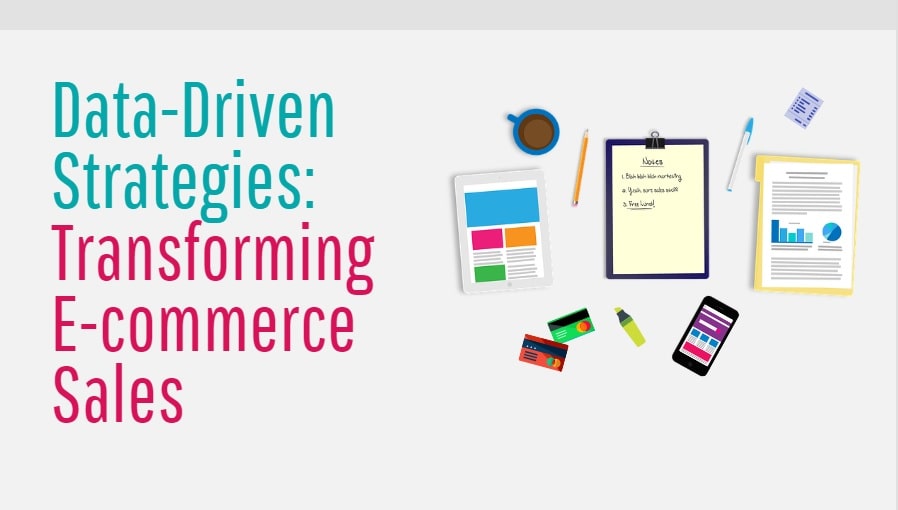Data-Driven Strategies: Transforming E-commerce Sales
In the ever-evolving landscape of e-commerce, data-driven strategies have become a game-changer. Leveraging data to make informed decisions can significantly impact sales, customer engagement, and overall success. A Data Analytics Course equips individuals with the skills to analyze e-commerce data effectively, helping businesses make informed decisions, personalize strategies, and optimize sales, further enhancing the impact of data-driven approaches. In this blog, we’ll delve into how data-driven strategies are revolutionizing e-commerce and explore practical ways businesses can harness the power of data to transform their online sales.
Table of Contents
The Power of Data in E-commerce
E-commerce has witnessed exponential growth over the years, and the availability of data has been a key driver behind this expansion. Data empowers businesses to understand customer behavior, fine-tune marketing efforts, optimize inventory management, and enhance the overall shopping experience.
- Customer Insights: Data allows e-commerce businesses to gain deep insights into customer preferences, browsing habits, and purchase history. By analyzing this data, businesses can tailor their offerings to meet customer needs and expectations.
- Personalization: With data, e-commerce platforms can provide personalized product recommendations, content, and marketing messages. Personalization enhances the shopping experience, increases customer engagement, and drives sales.
- Inventory Management: Data helps businesses track inventory levels in real-time, minimizing stockouts and overstock situations. Efficient inventory management ensures products are available when customers want to buy, improving customer satisfaction.
- Pricing Strategies: Data-driven pricing strategies, such as dynamic pricing, allow businesses to set competitive prices based on market demand, competitors’ prices, and other factors. This can lead to increased sales and profitability.
- Marketing Optimization: Data analytics enables businesses to measure the effectiveness of their marketing campaigns. This feedback loop helps allocate resources to the most successful campaigns and refine marketing strategies for better results.
How Data Transforms E-commerce Sales
Let’s explore in more detail how data-driven strategies can transform e-commerce sales:
- Improved Customer Segmentation: Data enables businesses to segment their customer base effectively. This segmentation allows for targeted marketing efforts, creating relevant product offers and personalized communication. When customers feel that a brand understands their needs, they are more likely to make a purchase.
- Optimized Pricing: As mentioned earlier, data-driven pricing strategies are powerful. By constantly monitoring market conditions, a business can adjust prices to maximize revenue without alienating customers. This dynamic pricing ensures that products are competitively priced.
- Enhanced User Experience: Data-driven strategies can identify pain points in the user experience. Whether it’s streamlining the checkout process, improving website navigation, or addressing customer complaints, data can highlight areas for improvement to enhance the overall shopping experience.
- Abandoned Cart Recovery: Many e-commerce platforms use data to track abandoned carts and automatically send reminders or incentives to encourage customers to complete their purchase. This practice has proven effective in recovering lost sales.
- Predictive Analytics: Predictive analytics uses historical data to forecast future trends and customer behavior. E-commerce businesses can leverage these insights to stock the right products, plan marketing campaigns, and make data-informed decisions.
- Inventory Management: Efficient data-driven inventory management ensures that businesses don’t run out of stock or tie up capital in excess inventory. This results in more efficient operations and maximizes sales opportunities.
Case Studies: Real-World Success Stories
To illustrate the practical impact of data-driven strategies in e-commerce, let’s look at a few case studies:
- Amazon: Amazon is renowned for its sophisticated data-driven strategies. Its recommendation engine, which uses customer browsing and purchase history, significantly contributes to its high sales volume. Amazon also employs data analytics to optimize pricing, inventory management, and shipping processes.
- Netflix: While not a traditional e-commerce platform, Netflix is a prime example of how data can transform sales. The streaming giant uses data to recommend movies and shows to subscribers, resulting in increased user engagement and retention.
- Zappos: The online shoe and clothing retailer Zappos uses data-driven strategies to personalize its shopping experience. By analyzing customer data, they offer tailored product recommendations and have seen a boost in sales and customer loyalty.
What are the strategies used in e-commerce?
In e-commerce, various strategies are employed to drive sales and achieve business objectives. These include digital marketing tactics like SEO and PPC advertising, personalization to tailor the shopping experience, optimizing user experience and conversion rates, leveraging social proof, adopting omnichannel retailing, implementing CRM systems, employing retention and loyalty programs, utilizing data analytics for insights, and incorporating social responsibility and sustainability initiatives. The specific strategies employed will depend on the business’s characteristics and goals, but a combination of these approaches can contribute to e-commerce success.
What is a data-driven sales strategy?
A data-driven sales strategy is an approach that relies on the analysis and utilization of data to inform and guide sales activities and decision-making. Hence, it involves collecting, analyzing, and interpreting relevant sales data to gain insights into customer behavior, market trends, and sales performance. This data can include information such as customer demographics, purchasing patterns, sales conversion rates, and revenue metrics.
Implementing Data-Driven Strategies
Now that we’ve seen the impact of data-driven strategies in e-commerce, let’s explore how businesses can implement these strategies effectively.
- Collect Relevant Data: Start by collecting data that is pertinent to your business goals. This may include customer demographics, browsing behavior, purchase history, and more. Implement tools and analytics platforms to gather and manage this data.
- Data Analysis: Invest in data analysis tools or hire data analysts to make sense of the collected data. Identify patterns, trends, and customer insights that can inform your e-commerce strategies.
- Personalization: Use customer data to personalize the shopping experience. This can involve product recommendations, personalized emails, and customized content based on user preferences.
- A/B Testing: Employ A/B testing to assess the effectiveness of different strategies. This allows you to make data-informed decisions and refine your approach continually.
- Predictive Analytics: Implement predictive analytics to forecast customer behavior, demand, and inventory needs. This helps you plan more efficiently and make proactive adjustments to meet customer expectations.
- Security and Compliance: Ensure that you handle customer data securely and in compliance with data protection regulations. Data breaches can severely harm your reputation and erode trust.
- Training and Education: Invest in training and education for your team to understand and leverage data-driven strategies effectively. Building data literacy within your organization is crucial for success.
Challenges and Considerations for Data Driven Strategies
While data-driven strategies offer significant advantages, they also come with challenges and considerations:
- Data Privacy: The handling of customer data must comply with privacy regulations like GDPR and CCPA. Mishandling customer data can lead to legal consequences and damage your brand’s reputation.
- Data Quality: The accuracy and quality of data are paramount. Inaccurate or outdated data can lead to flawed insights and misguided decisions.
- Over Reliance on Data: While data is valuable, it’s essential to balance it with human judgment and creativity. Because an overreliance on data can stifle innovation and limit growth opportunities.
- Technology Investment: Implementing data-driven strategies may require substantial investments in technology and talent. So, it’s important to weigh the costs against the expected benefits.
Conclusion on Data-Driven Strategies for Sales and Marketing
In today’s e-commerce landscape, data-driven strategies have become a driving force behind increased sales, improved user experiences, and optimized operations. Hence, leveraging data allows businesses to better understand their customers, personalize their offerings, and make informed decisions that lead to growth. The successful implementation of these strategies requires careful data collection, analysis, and consideration of data privacy and quality.
As technology continues to advance, and more data becomes available, businesses that harness the power of data will be better positioned to thrive in the competitive world of e-commerce. Embracing data-driven strategies is not just an option. So, it’s a necessity for those looking to transform their e-commerce sales and stay ahead in the digital marketplace.

11+ years strategic communications, marketing, and project management experience. I am a trainer at StarWood Training Institute, focusing on online courses for project management professionals.












